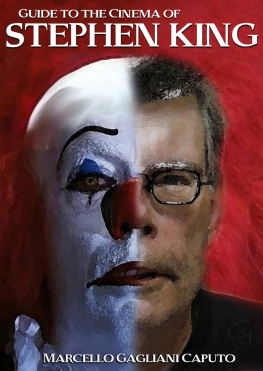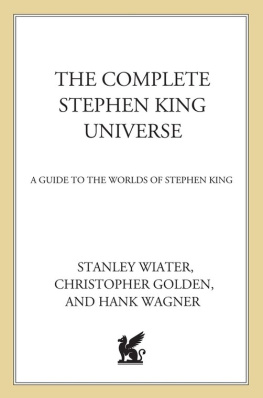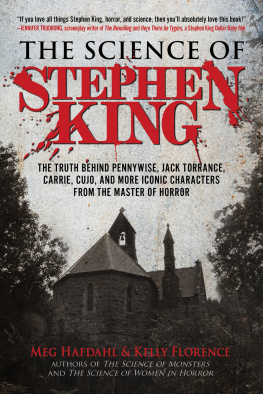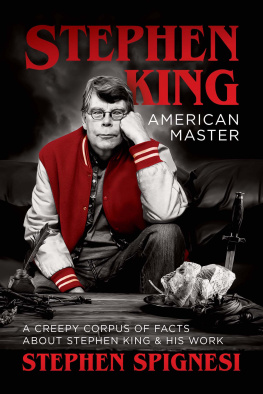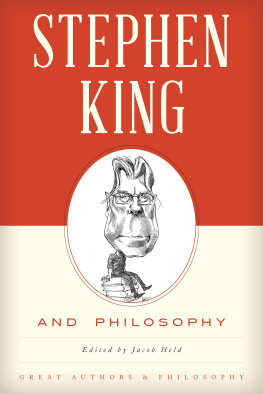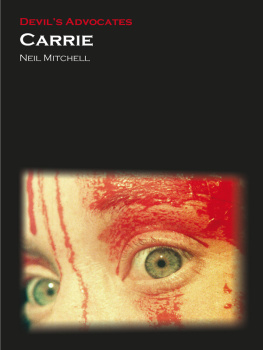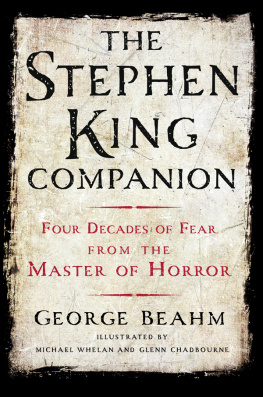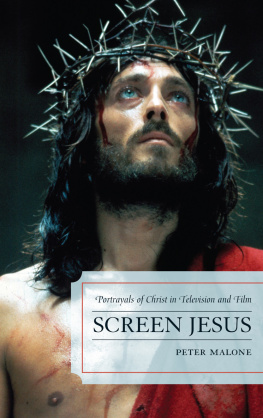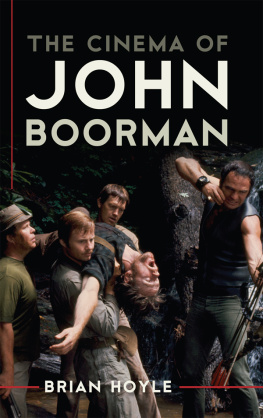Guide to the Cinema of Stephen King
Marcello Gagliani Caputo
Translated by E.S. Dempsey
Guide to the Cinema of Stephen King
Written By Marcello Gagliani Caputo
Copyright 2016 Marcello Gagliani Caputo
All rights reserved
Distributed by Babelcube, Inc.
www.babelcube.com
Translated by E.S. Dempsey
Cover Design 2016 Gianluca Morena
Babelcube Books and Babelcube are trademarks of Babelcube Inc.
GUIDE TO THE CINEMA OF STEPHEN KING
Marcello Gagliani Caputo
Translated by E.S. Dempsey
Cover illustration by Gianluca Morena
At that time I was drunk from morning to night and the crew was Italian we didnt understand a thing we were saying to each other. The result was the worst horror film in the history of cinema.
Stephen King about Maximum Overdrive
Contents
Preface
b y Stefano Pastor
Every writers dream and nightmare is to see his work turned into a film, because film and literature use completely different languages. In literature the story is told meticulously, including the characters moods, while in film the story becomes a static image where the details are filled in by the viewers perceptions. Also, a film is a group effort which not only has the contributions of the director and writer, but also attaches great importance to the production team and the skills of the actors.
You usually hear that the book is better. Any dedicated reader will repeat that over and over. Books stimulate the imagination and compel the reader to make a visual translation of the written word. It follows that this visual interpretation, which is different from reader to reader, will never correspond to what comes to the screen, and that causes great suffering for the poor author, who is aware that the book is no longer his, and who in the end wont recognize it. His compensation is being able to win fame and fortune... maybe.
Unlike other authors, such as the late Michael Crichton, Stephen Kings books were not written to be made into films. In the first place the characters have too many streams of consciousness, but also the scenarios are too elaborate and imaginative, difficult to recreate without excessive cost (especially in the period when computer graphics were still in their early stages). Despite this, the long-term success of a writer like Stephen King is indissolubly linked to the movies. Indeed, it is precisely those films that completely distorted his books which have raised them from the niche genre in which they were immersed up to the level of the best literature. And this was done in a really bizarre way, by intentionally butchering the books until they were completely destroyed.
Its undeniable that the films Carrie and The Shining made King what he is today, but theres very little of King in these movies. So little that its pointless to discuss whether the books or the films are better theyre two different things.
Carrie was not structured to become a movie; it was a pseudoscientific documentation of the study of paranormal phenomena, attempting to give it a logical explanation. De Palma reduced it to its bones, using only a few guidelines, abandoning all the scientific explanations because he wasnt interested, and placing the burden on the two lead actors to hold up the movie. Sissy Spacek and Piper Laurie play their characters over the top, giving the film a universal sensibility.
The Shining is the same because Kubrick also puts the burden of sustaining the story on the expressiveness of the two great actors Jack Nicholson and Shelley Duvall not on the written word, which is useless (remember the writer in the film does nothing but write the same sentence over and over). Where King is still immature they excel, taking raw characters and making them eternal. Its the situations that dominate (puberty in Carrie , isolation in The Shining ) rather than the plots, which are little more than a pretext. The characters step out of their stories and become self-sufficient, assuming their own reality.
How difficult to imagine the reaction of an author who has reached enviable celebrity from film adaptations that arent at all faithful to his original works. But whatever criticism there may be, they continue to be adapted, as demonstrated by ongoing productions. In fact the rapport between King and film is a closed circle that has never been broken, and the more that the films deviate from the books, the better their quality, because other personalities take over directors, screenwriters, and even actors (what would Misery be without Kathy Bates?).
All the greatest directors compete with the works of King. Their results are erratic, but encounters with such original characters make for unforgettable films. Carpenter, Romero, Cronenberg these are only some of the names. Together they write great pages in the cinema of horror. But two names in particular have made a perfect combination, two authors who were able to assimilate Kings style and transform it into an explosive cocktail. Im talking about Rob Reiner and Frank Darabont, whose film productions were taken from Different Seasons , a collection of four short novellas that are exceptions for Stephen King because theyre not horror and are therefore outside his usual style.
What makes them perfect for the screen is their length. They arent books of hundreds of pages that must be reduced, nor are they tales of twenty pages that have to be enlarged; they have just the right momentum to become films. From these novellas Darabont mapped out The Shawshank Redemption and Reiner created Stand by Me , destined to become the highest expressions of the union of literature and cinema. Beautiful stories, but even King while writing them could hardly have imagined that they would become his masterpieces.
Even though Reiner and Darabont have completely different ideas about how to make films, they both produce superlative results. In such cases its correct to say that the film surpasses the book. The Shawshank Redemption has for many years been considered on the Internet Movie Data Base (IMDB) to be the most beautiful film in cinema history, and that is something not even King could have foreseen. Both directors tried again to replicate that magic, Darabont with The Green Mile and Reiner with Misery . They turned out two other masterpieces, but they werent equal to their previous films. The size of the literary works is to blame, which forced Reiner to cut his movie and Darabont to stretch his too much. The magic of Different Seasons was not to be repeated. Over the years Kings books have become even longer, making film adaptations more complicated.
King has never abandoned a desire to see his books turned into movies, but he has chosen to give preference to the medium of television. Its a questionable choice, but it allows him more control. It favors length over quality, fidelity to the books over originality. He has accepted a kind of self-censorship that domesticates the horror so as to make the stories appealing to everyone. In particular he increasingly writes the screenplays to his films, refusing to accept the fact that a good writer is rarely equipped to summarize the essentials in the realm of film.
The products of this union do not excel. The extra length doesnt help, and the characters lack emotional depth. The story lines remain unchanged, but they arent on a par with the books. For example, the miniseries It is the most beautiful of these adaptations, but its just a shadow of the original. By regaining control over his works King gave up confronting new ideas and new talent, and gradually moved away from film entirely, so that only a few scraps remain. For many years now he has only made movies from his short stories, while television is the vehicle for his novels.
Mature and worthy choices, but they leave one with a sense of sadness. Its impossible not to make comparisons, to imagine what a certain novel might have become in the hands of a visionary and courageous director, who perhaps would have altered it and generated a new masterpiece. Nevertheless, the king is far from finished, and his output has never suffered from slowdowns. Great things are ahead, and hope remains that his star will presently shine again in the world of cinema.
Next page
